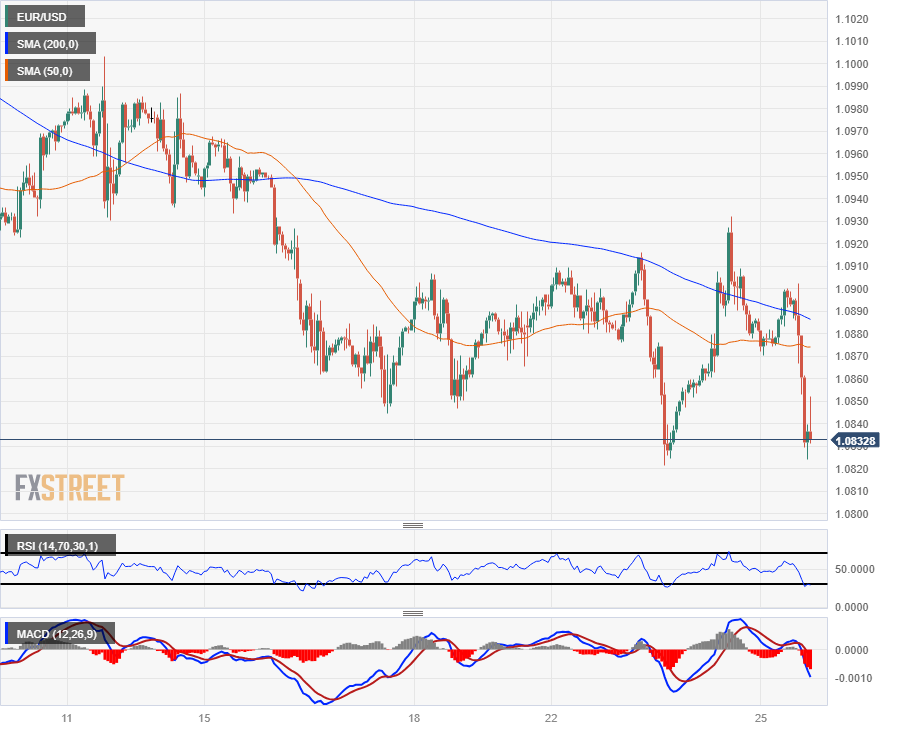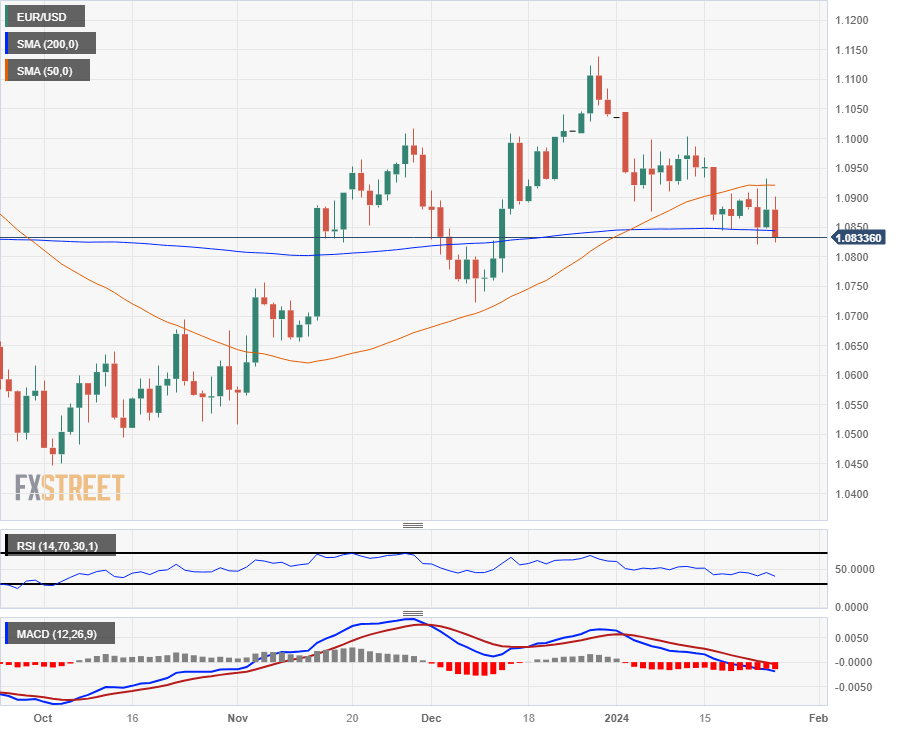- Аналітика
- Новини та інструменти
- Новини ринків
- Euro slumps after ECB holds rates flat, markets price in June rate cuts
Euro slumps after ECB holds rates flat, markets price in June rate cuts
- Euro tumbles from familiar technical levels after ECB offers dovish tone.
- Europe sees thin economic data until GDP update next Tuesday.
- Broader markets to focus on Friday’s US PCE Price Index to wrap up the trading week.
The Euro (EUR) fell on Thursday after the European Central Bank (ECB) struck a dovish tone during its latest monetary policy statement, which sent the Euro down against the majority of its major currency peers. Money markets added into bets of a 50 basis point rate cut from the ECB by June despite firm language from ECB President Christine Lagarde warning that the consensus within the ECB is that discussion of rate cuts is far too premature in the face of price risks from rising wages and a still robust job market.
Economic data from Europe is strictly low-tier for the rest of the week, and markets will focus on US Personal Consumption Expenditure (PCE) Price Index figures, a snapshot of inflation, to be released on Friday. European investors will have to wait until next Tuesday’s EU Gross Domestic Product (GDP) update for economic headlines from the Euro side.
Daily digest market movers: Euro slides on Thursday after ECB tilts dovish
- European Central Bank President Christine Lagarde warned on Thursday that risks still remain and it’s far too early to begin discussing rate cuts.
- Despite easing economic conditions and stagnant growth figures emanating from Europe, key inflation risks still remain high.
- ECB President Lagarde says that interest rate hikes are beginning to transmit “forcefully into financing conditions”.
- ECB highlighted inflation risks from Middle East tensions, economy needs more time to be further along in disinflation process.
- Despite decreases in some measures, domestic price pressure remains high overall.
- European money markets added bets of 50 bps of rate cuts by June, 150 bps through the end of 2024, rising after the ECB rate call.
- ECB Press Conference: Lagarde explains decision to keep rates steady, speaks on policy outlook
- On the US side, Gross Domestic Product (GDP) growth in the fourth quarter beat expectations.
- US Q4 GDP grew 3.3% compared to the forecast of 2.0%, easing back less than expected from the previous quarter’s 4.9%.
- US Initial Jobless Claims also ticked upwards into 214K for the week ended January 19, above the forecast for 200K versus the previous week’s 189K (revised upwards from 187K).
- US Initial Jobless Claims have risen above the four-week average of 202.25K.
- Friday brings US PCE Price Index figures, markets to focus on key inflation data for Fed direction.
Euro price today
The table below shows the percentage change of Euro (EUR) against listed major currencies today. Euro was the strongest against the Swiss Franc.
| USD | EUR | GBP | CAD | AUD | JPY | NZD | CHF | |
| USD | 0.44% | 0.26% | -0.18% | 0.02% | 0.19% | -0.04% | 0.52% | |
| EUR | -0.45% | -0.17% | -0.63% | -0.45% | -0.26% | -0.51% | 0.09% | |
| GBP | -0.27% | 0.17% | -0.45% | -0.27% | -0.08% | -0.33% | 0.25% | |
| CAD | 0.17% | 0.62% | 0.44% | 0.18% | 0.36% | 0.12% | 0.70% | |
| AUD | 0.00% | 0.43% | 0.25% | -0.19% | 0.19% | -0.06% | 0.53% | |
| JPY | -0.19% | 0.26% | 0.07% | -0.37% | -0.19% | -0.24% | 0.33% | |
| NZD | 0.08% | 0.49% | 0.32% | -0.13% | 0.06% | 0.25% | 0.57% | |
| CHF | -0.54% | -0.10% | -0.27% | -0.71% | -0.52% | -0.33% | -0.59% |
The heat map shows percentage changes of major currencies against each other. The base currency is picked from the left column, while the quote currency is picked from the top row. For example, if you pick the Euro from the left column and move along the horizontal line to the Japanese Yen, the percentage change displayed in the box will represent EUR (base)/JPY (quote).
Technical Analysis: Euro slides on ECB tone, EUR/USD rejected from 1.0900 yet again
Euro (EUR) fell against the US Dollar (USD) on Thursday, declining and dragging the EUR/USD back below the 1.0900 handle and seeing another technical rejection from the 200-hour Simple Moving Average (SMA) near 1.0885.
The pair has tumbled back into a familiar low end with bids snarled on the 200-day SMA near 1.0840. EUR/USD is caught in a widening congestion trap between the 50-day and 200-day SMAs as a technical consolidation pattern continues to hamper meaningful momentum in either direction.
EUR/USD Hourly Chart
EUR/USD Daily Chart
Euro FAQs
What is the Euro?
The Euro is the currency for the 20 European Union countries that belong to the Eurozone. It is the second most heavily traded currency in the world behind the US Dollar. In 2022, it accounted for 31% of all foreign exchange transactions, with an average daily turnover of over $2.2 trillion a day.
EUR/USD is the most heavily traded currency pair in the world, accounting for an estimated 30% off all transactions, followed by EUR/JPY (4%), EUR/GBP (3%) and EUR/AUD (2%).
What is the ECB and how does it impact the Euro?
The European Central Bank (ECB) in Frankfurt, Germany, is the reserve bank for the Eurozone. The ECB sets interest rates and manages monetary policy.
The ECB’s primary mandate is to maintain price stability, which means either controlling inflation or stimulating growth. Its primary tool is the raising or lowering of interest rates. Relatively high interest rates – or the expectation of higher rates – will usually benefit the Euro and vice versa.
The ECB Governing Council makes monetary policy decisions at meetings held eight times a year. Decisions are made by heads of the Eurozone national banks and six permanent members, including the President of the ECB, Christine Lagarde.
How does inflation data impact the value of the Euro?
Eurozone inflation data, measured by the Harmonized Index of Consumer Prices (HICP), is an important econometric for the Euro. If inflation rises more than expected, especially if above the ECB’s 2% target, it obliges the ECB to raise interest rates to bring it back under control.
Relatively high interest rates compared to its counterparts will usually benefit the Euro, as it makes the region more attractive as a place for global investors to park their money.
How does economic data influence the value of the Euro?
Data releases gauge the health of the economy and can impact on the Euro. Indicators such as GDP, Manufacturing and Services PMIs, employment, and consumer sentiment surveys can all influence the direction of the single currency.
A strong economy is good for the Euro. Not only does it attract more foreign investment but it may encourage the ECB to put up interest rates, which will directly strengthen the Euro. Otherwise, if economic data is weak, the Euro is likely to fall.
Economic data for the four largest economies in the euro area (Germany, France, Italy and Spain) are especially significant, as they account for 75% of the Eurozone’s economy.
How does the Trade Balance impact the Euro?
Another significant data release for the Euro is the Trade Balance. This indicator measures the difference between what a country earns from its exports and what it spends on imports over a given period.
If a country produces highly sought after exports then its currency will gain in value purely from the extra demand created from foreign buyers seeking to purchase these goods. Therefore, a positive net Trade Balance strengthens a currency and vice versa for a negative balance.
© 2000-2026. Уcі права захищені.
Cайт знаходитьcя під керуванням TeleTrade DJ. LLC 2351 LLC 2022 (Euro House, Richmond Hill Road, Kingstown, VC0100, St. Vincent and the Grenadines).
Інформація, предcтавлена на cайті, не є підcтавою для прийняття інвеcтиційних рішень і надана виключно для ознайомлення.
Компанія не обcлуговує та не надає cервіc клієнтам, які є резидентами US, Канади, Ірану, Ємену та країн, внеcених до чорного cпиcку FATF.
Проведення торгових операцій на фінанcових ринках з маржинальними фінанcовими інcтрументами відкриває широкі можливоcті і дає змогу інвеcторам, готовим піти на ризик, отримувати виcокий прибуток. Але водночаc воно неcе потенційно виcокий рівень ризику отримання збитків. Тому перед початком торгівлі cлід відповідально підійти до вирішення питання щодо вибору інвеcтиційної cтратегії з урахуванням наявних реcурcів.
Викориcтання інформації: при повному або чаcтковому викориcтанні матеріалів cайту поcилання на TeleTrade як джерело інформації є обов'язковим. Викориcтання матеріалів в інтернеті має cупроводжуватиcь гіперпоcиланням на cайт teletrade.org. Автоматичний імпорт матеріалів та інформації із cайту заборонено.
З уcіх питань звертайтеcь за адреcою pr@teletrade.global.















